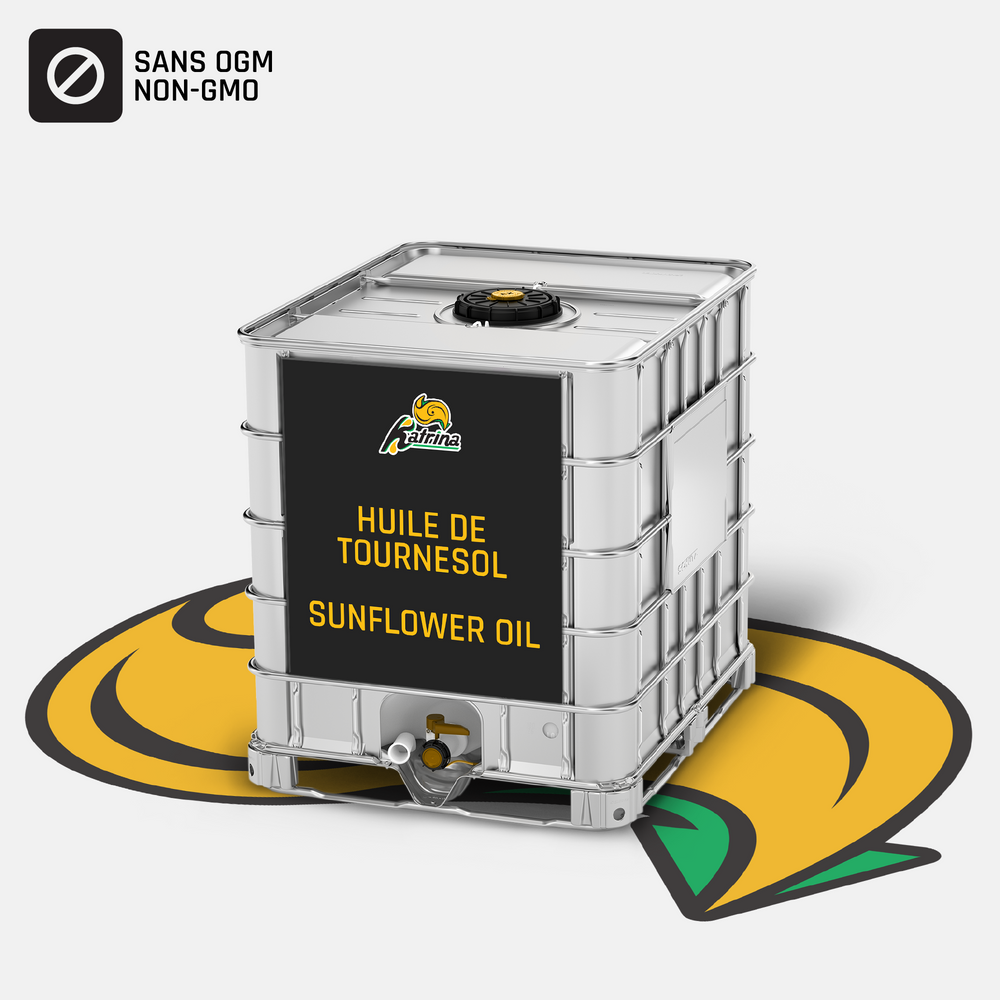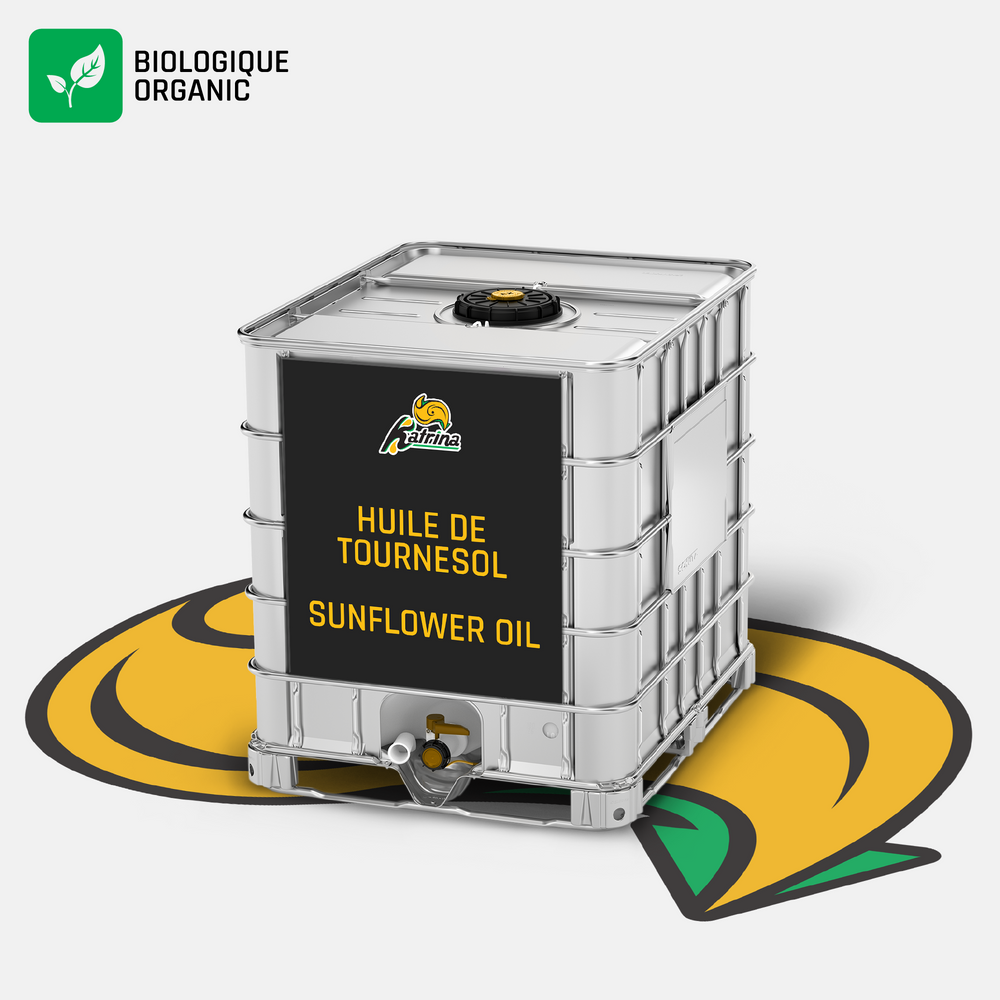Sunflower Oil: A Complete Guide to Varieties, Benefits, and Uses
Sunflower oil is one of the world’s most widely used cooking oils, valued for its light taste, versatility, and nutritional profile. Made from the seeds of the sunflower plant, it comes in different varieties (like refined, cold-pressed, and organic) each with unique qualities.
In a nutshell (or a sunflower shell, wink wink), this type of oil is known for its neutral flavour, versatility, and high smoke point.
This article will outline all the details about how sunflower oil is made, its health profile, culinary performance, and what to look for when buying in bulk.
How Sunflower Oil is Made
Sunflower oil production begins with cleaning and dehulling the seeds to remove debris and outer shells.

The seeds are then either cold-pressed or subjected to a refined extraction process. Cold-pressed oils retain a more golden colour and a distinct nutty aroma, while refined oils are paler and milder, making them slightly more adaptable for large-scale cooking.
After the initial pressing or extraction process, additional steps like filtration, degumming, neutralization, bleaching, and/or deodorization are sometimes added to remove impurities and extend shelf life. Generally, cold-pressed oils go through less processing overall.
Specialty options like organic sunflower oil and non-GMO sunflower oil follow the same core process, with organic certification requiring pesticide-free cultivation and non-GMO verification for seed sourcing.

Types of Sunflower Oil: Comparing Your Options
- Refined sunflower oil (also referred to as linoleic sunflower oil) is the most commonly sold variety, and it’s what you’ll find in most grocery stores and bulk suppliers. It’s usually just labelled as “sunflower oil”. This type of sunflower oil has a neutral taste and high smoke point due to the refining process it undergoes.
- Cold-pressed sunflower oil is less processed, which allows it to retain more of the natural flavour, aroma, and nutritional value. This type of oil has a slightly nutty flavour and a visibly deeper colour. While cold-pressing results in a slightly shorter shelf life and lower smoke point, it is the preferred method for producing high-quality, specialty sunflower oil.
- Organic & Non-GMO sunflower oil offers similar benefits to traditional and cold-pressed varieties but adds consumer trust through clean-label certifications. These types of oil are produced solely using natural methods, resulting in the same high smoke point and neutral flavour, but free from chemicals, additives, and preservatives.
- High oleic sunflower oil is specially bred to be rich in monounsaturated fats (oleic acid), making it more stable than traditional sunflower oil. This higher proportion of monounsaturated fats gives it a longer shelf life, higher smoke point, and healthier fat profile.
Sunflower Oil’s Health Profile and Nutritional Value
Sunflower oil offers a mix of potential health benefits and considerations.
Sunflower oil is low in saturated fat and high in unsaturated fat, making it a heart healthy oil. It is also a notable source of vitamin E, an antioxidant that helps protect cells and supports immune function.
At the same time, sunflower oil is high in omega-6 which may promote inflammation, if not properly balanced with omega-3s. Balanced use of high-oleic or cold-pressed sunflower oil, especially when paired with omega-3-rich foods, can help maximize its benefits while limiting potential drawbacks.
Sunflower Oil Nutrition Table (per 1 tbsp)
- Calories: 120
- Total Fat: 13.6g
- Saturated Fat: 1.8g
- Monounsaturated Fat (i.e. oleic acid): 6.3g
- Polyunsaturated Fat (i.e. linoleic acid): 5g
- Vitamin E: 5.6mg (37% of Daily Value)
- Vitamin K: 0.73 µg (0.61% of Daily Value)
Culinary Uses of Sunflower Oil
Sunflower oil adapts to a diverse range of cooking tasks, thanks to its neutral taste and high smoke point. It performs reliably in frying, sautéing, and roasting at temperatures up to around 450°F (232°C), making it a dependable choice for home cooks and commercial kitchens alike.
Bakers often use refined sunflower oil to keep cakes, cookies, and quick breads moist without altering flavours, and it’s generally interchangeable with other neutral oils like canola oil or vegetable oil blends.
“The high smoke point when cooking leads to less burning and less acrid tastes,” says Antonette Hardie, R.D.N., L.D., a nutritionist at The Ohio State University Wexner Medical Center. “It also doesn’t have a strong flavor, allowing the taste of what you’re cooking to really shine through.”
Organic Certification Standards and Sustainability
Organic sunflower oil must meet strict agricultural and processing standards before it can carry a certified organic label. Crops must be grown without synthetic pesticides, herbicides, or genetically modified seeds.
Soil health is maintained through crop rotation, composting, and natural pest management. In Canada and the U.S., certification is managed by bodies like the USDA or the Canadian Food Inspection Agency. These measures ensure products like organic sunflower oil in bulk meet consumer expectations for purity and sustainability.
Sunflower crops are also known for their relatively low input requirements compared to more water-intensive oilseeds like soybeans. On average, sunflowers require 20–30% less irrigation water per hectare, depending on regional climate. They also contribute to soil health through deep root systems that reduce erosion and improve nutrient cycling.
Buying and Storing Sunflower Oil in Bulk
Sunflower oil remains one of the most versatile and widely used cooking oils in both home and commercial kitchens. Its neutral flavour, high smoke point, and adaptability to various cooking techniques make it suitable for everything from light sautéing to industrial-scale frying. Proper storage is key when buying sunflower oil in bulk. For best results, oil should be stored in a cool, dark place away from heat and direct sunlight. When properly stored, refined varieties can last up to 12 months unopened (and several months once opened), while cold-pressed oils typically have a shorter shelf life of about 6 months.
–
If you’re curious about using bulk sunflower oil for your restaurant or food production project, reach out to us today to get a quote!










